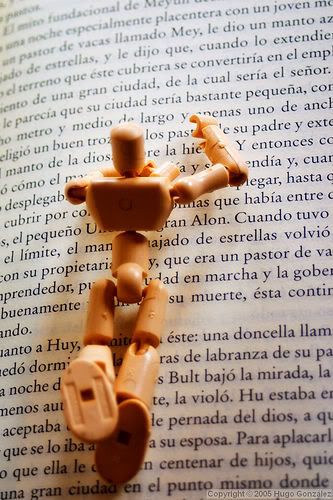 It’s been a while since a post was published here in this blog. The main reason was that adrian’s puppeteer was having a huge work regarding the III Encontro Oeiras a Ler – A Promoção da Leitura para os Públicos Jovens e o Papel da Biblioteca Pública. And, for the same reason, this text will be entirely in English. Why, would you ask? Well, due to some reflections that came afterwards. But, read on and you’ll find out more…
It’s been a while since a post was published here in this blog. The main reason was that adrian’s puppeteer was having a huge work regarding the III Encontro Oeiras a Ler – A Promoção da Leitura para os Públicos Jovens e o Papel da Biblioteca Pública. And, for the same reason, this text will be entirely in English. Why, would you ask? Well, due to some reflections that came afterwards. But, read on and you’ll find out more…The meeting was quite good. One should not be ashamed of making a nice work, and all the team from the Oeiras Public Libraries connected to this event finished it with a sense of accomplishment and fulfilment. Over two days the speakers shared their best practices, the audience asked pertinent questions, the breaks and schedules were respected in the best way possible, the simultaneous translation went as planned and Manuela Barreto Nune's task of Conclusions/Recommendations was very sucefull, acting has a summula of all the work produced in the 29th and 30th of May. Max Butlen and José Soares Neves made their presentations based in a more theoretical way, in the first morning, while the afternoon brought the field experience of Michele Gorman and Jonathan Douglas. The second day came with more practical overviews from Christian Schmitz, Lorenzo Soto and Paula Brehm-Heeger. Each moderator acted as planned, introducing the professionals invited and conducting the discussions afterwards.
So, what does this have to do with writing a post in English? Well, there were 110 seats available and, more or less, 80 inscriptions. The 45 euros fee included lunch on both days (so, it was not expensive). Taking this in consideration, one of the main surprises of the speakers (who where, “only”, the Director of the National Literacy Trust, the President of Yalsa, the architect working on a regular basis with the Bertelsmann Foundation, a responsible of the Centre of Childhood and Youth Literature of the German Sanchez Ruy-Perez Foundation, one of the best recognized trainers of youth librarians in the U.S.A., a university teacher that already worked for the governments of Brazil and France and that is one of the most recognized experts in youth literature, reading and pedagogy and – last but not least - a renowned Portuguese investigator of the Observatório das Actividades Culturais) was that the room where the III Encontro took place was not full. From one of them it was heard the following comment:
“I never had seen such a programme regarding teens and public libraries from so many different countries and aggregating different views. I know at least 20 or 30 professionals from my home country that would pay to be here”.
So, here’s the reason why adrian wrote this post in English. If Portuguese (and this includes people from public, school and university libraries, state and private institutions and post-graduate students) aren’t enough to fill up a room of 110 seats (which one could find – and can -, rather unbelievable, especially concerning the programme proposed), so let’s start speaking to the next targeted audience. Got it?
p.s. – and don’t be afraid, you Portuguese Librarians that came to this III Encontro: for you who have the will to speak out, share and think, adrian bets that there’ll always be a pair of headphones.
p.s. – and don’t be afraid, you Portuguese Librarians that came to this III Encontro: for you who have the will to speak out, share and think, adrian bets that there’ll always be a pair of headphones.
foto aqui



Sem comentários:
Enviar um comentário